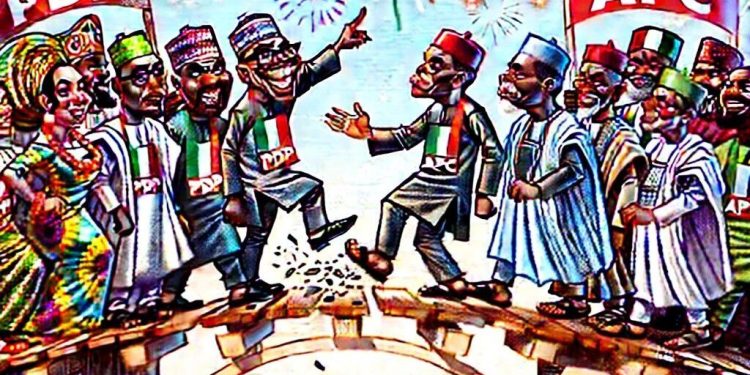By YUSUF ABUBAKAR
It is not unusual for Nigerian politicians to switch party allegiance. But something appears distinctly different this time. With over a year remaining before the next general elections, the volume and pace of defections suggest a shifting political order.
During the recent All Progressives Congress (APC) convention in Kaduna State, organised to welcome 5,000 new members from opposition parties, the Speaker of the House of Representatives, Hon. Tajuddeen Abbas, boldly declared, “Kaduna State is now a one-party state.” His claim reflects a reality where the APC dominates all three senatorial zones of the state.
Governor Uba Sani reinforced this sentiment, boasting that the APC had transformed from holding only four of Kaduna’s sixteen House of Representatives seats to fourteen — a feat he attributed to “commitment in promoting peace and good governance.” He further highlighted that influential figures like former Governor Ramalan Yero and ex-Senator Shehu Sani had also joined the APC, underscoring what appears to be a systematic consolidation of power.
Reports from across the country, particularly from southern Nigeria, reveal a similar pattern of mass defections. Key political figures, including governors and senators, are abandoning their former parties in favour of the ruling APC.
This wave of movement continues despite attempts by other political forces to form coalitions. For instance, under the umbrella of the Action Democratic Congress (ADC), prominent politicians such as Senator David Mark, Atiku Abubakar, Nasir el-Rufai and Peter Obi are said to be exploring ways to strengthen opposition unity. Similarly, the People’s Democratic Party (PDP) is reportedly courting former President Goodluck Jonathan to return as its presidential candidate. Yet, the APC appears to be gathering even greater strength and momentum.
In Plateau State, signs of political realignment are also emerging. Governor Caleb Mutfwang of the PDP has been seen maintaining cordial relations with his former rival and current APC National Chairman, Professor Nentawe Yilwatda, fuelling speculations that the governor might soon switch allegiance to the APC.
But only last week, the governor declared that, despite mounting pressure from political stakeholders, he would remain in the PDP. During a Saturday event at the banquet hall of the Government House, Rayfield, the governor said: “It is not a lie that they also put pressure on me. But I told them only two people would authorise me to change my party. One is the God of heaven, then the other is you, the people.”
However, the gale of defections are not confined to the North-Central region, where Mutfwang is the last PDP governor standing, so to say. In the Northeast, Governor Bala Mohammed of Bauchi remains one of the few who have not joined the APC, while in the Northwest, only a handful of governors are outside the ruling party.
These widespread defections have led to mounting concerns that Nigeria may be gradually drifting toward a de facto one-party system — a scenario that could weaken democratic checks and balances. Many observers are now questioning whether President Bola Tinubu’s second term is already assured or whether the opposition has lost its potency.
Adding another layer of uncertainty are reports by PREMIUM TIMES alleging a foiled coup attempt involving an undisclosed “former governor in the South.” Analysts warn that such developments, if true, could pose new threats to Nigeria’s fragile democratic experiment.
The unfolding events leave Nigeria’s political future uncertain. As defections multiply, the question remains whether this signals a new era of political alignment or a dangerous erosion of democratic plurality.
What seems clear is that Nigerians are increasingly disillusioned with party ideology. Today, political loyalty is often tied less to party manifestoes and more to individual personalities and their perceived capacity to deliver. Whether this evolution strengthens or weakens Nigeria’s democracy is a question that only time — and the next elections — will answer.
Abubakar, a Mass Communication student from the University of Jos, is on IT with THE NIGERIA STANDARD



